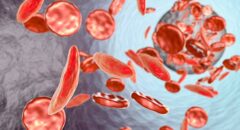
An inherited blood disorder that can cause serious problems, Sickle Cell Disease unfortunately affects Black Americans disproportionately. And that’s where the problems begin. Because if you didn’t know, many stereotypes about Black sufferers of this disease are floating around, and most of them can be easily dispelled.
It’s a serious issue that demands serious consideration. So let’s get right into it.
Here are six stereotypes you need to know…
1. “It’s Just Pain—Suck It Up”
Many people think that the pain caused by SCD is not that bad or that it’s not much of a problem because it can easily be treated. This is not accurate. In reality, the severity of sickle cell pain can be intense and debilitating.
But first, you have to understand why. The reason the pain happens is because the red blood cells change shape, which can cause tremendous pain and serious blockage and organ damage.
So it’s more than just pain that comes and goes. It’s a pain that is based on a very real physiological change in the body and it needs to be discussed appropriately.
2. “Only Black People Get Sickle Cell Disease”
Unfortunately, this stereotype has gained traction in recent years, and for no good reason. Statistically, it is true that people of African descent are more likely to be diagnosed with SCD. However, that does not mean that it is a disease exclusive to Black Americans.
In fact, SCD impacts many people of many races and ethnicities, including people of Indian, Middle Eastern, and Mediterranean descent.
To think that SCD is a ‘Black disease’ is not only inaccurate but damaging.
RELATED: Beyond the Pain: 4 Unseen Obstacles Sickle Cell Warriors Face Every Day
3. “They’re in Pain Because They’re Junkies”
Sadly, a lot of people with legitimate SCD concerns are dismissed by the medical community. This happens because they are considered to be drug addicts or ‘junkies,’ complaining of pain that they caused themselves.
This could not be further from the truth.
Relatively simple tests can determine that somebody is suffering from SCD and not a ‘junkie,’ but unfortunately, this doesn’t happen as often as it should. Future improvement in healthcare can help address these stereotypes and biases.
4. “All Symptoms Are Easily Seen”
Another misconception.
Sure, the most obvious symptoms are jaundice and severe pain, but in many cases, individuals with SCD may struggle to show apparent symptoms. This happens because many of them are internal. For instance, chronic tiredness, ongoing illnesses, and arrested child growth are all symptoms that may not be immediately apparent.
This is why people with SCD should routinely visit doctors, chart their symptoms, and formulate an individualized plan that can curb their disease trajectory.
5. “Sickle Cell Disease Is a Rare Condition”
While your chances of not getting it are certainly greater than your chances of getting it, that doesn’t mean you should dismiss it.
SCD is a serious health concern in many areas of our world, especially in places like India and Nigeria, where it impacts a significant slice of the population. Because of that, it’s always important to understand what you’re facing. SCD is not just some super rare disease that impacts only a very few.
It has real and lasting effects, and in America alone, it’s estimated that up to 100,000 people have it. While not as prevalent as other major diseases, when it does occur, its effects can be way more severe and life-disrupting!
6. “Sickle Cell Disease Only Affects Children”
Yes, SCD is usually detected in childhood, but that doesn’t make it a ‘childhood disease.’
Unfortunately, SCD lasts for life. If left unmanaged, it can have life-threatening impacts and can pose ongoing challenges such as chronic pain, organ damage, and other serious complications.
This is why it’s important to get a proper diagnosis as soon as possible and start addressing the issue as soon as possible.
While SCD is not necessarily a death sentence or even a life-changing diagnosis, it can be if you don’t take it seriously. So take it seriously! If you’re unfamiliar with the condition and you’re not sure what you need to do to treat it, then you have options.
Many healthcare professionals have become way more educated on SCD in recent years, especially given advancements in treatments, such as gene therapy.
RELATED: How Does Gene Therapy for Sickle Cell Work? 5 Things You Need to Know
If you or someone you know is suffering from the condition, do not despair. With an appropriate and full-spectrum approach, not only can you keep SCD under control, but you can live a life that is more ‘normal’ and fulfilling than you ever previously thought!








